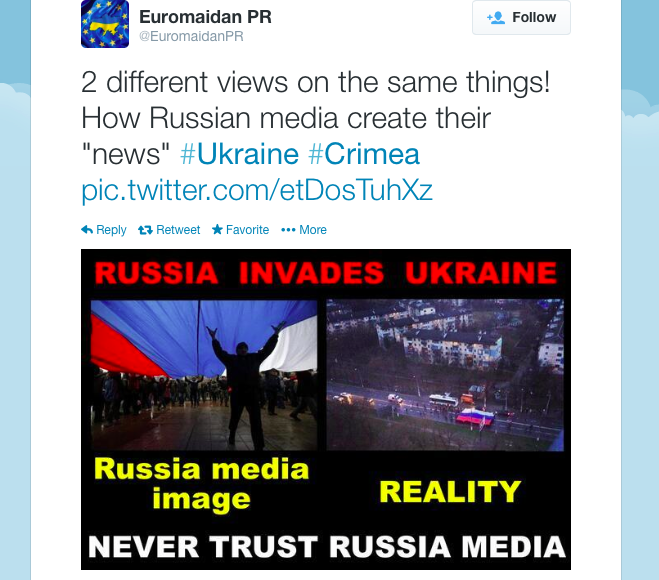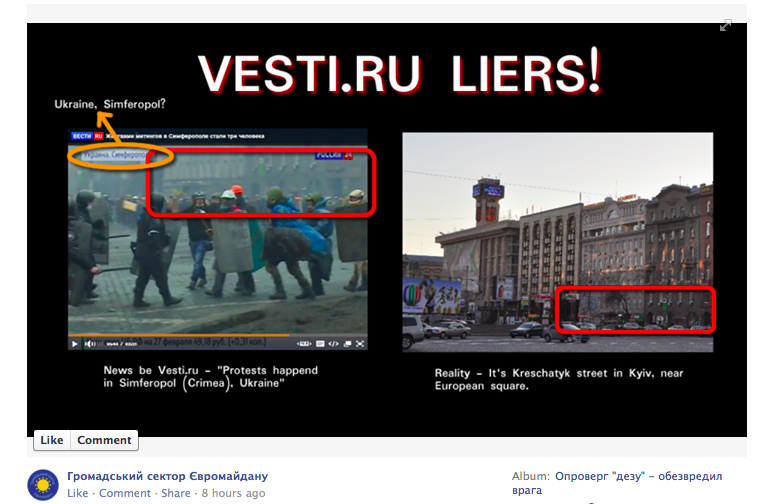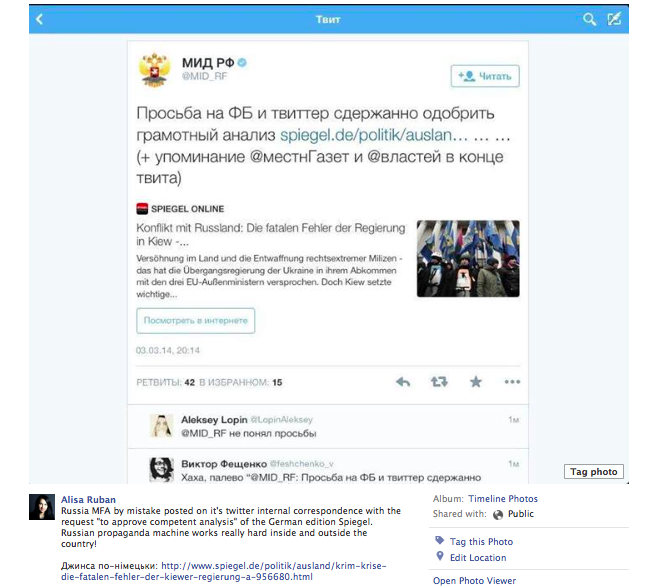
A composite image created by activists showing the same event in Crimea from two vantage points, to stress how different frames can be applied to news. Courtesy of Euromaidan PR on Twitter.
As tensions escalate with Ukraine accusing Russia of invading its autonomous southern region Crimea, Ukrainian activists are busy debunking false news in Russian media by sifting fact from propaganda online.
Social network users on both sides have weighed in on the conflict, and have been active in commenting, posting videos of protests and expressing themselves through memes. In response, social media sites such as Russia's VK (VKontakte) network, the most active social network in Europe, have been blocking some protest-related Ukrainian groups, making them unavailable for those with Russian IP addresses.
Mainstream media in Russia, however, have been especially ardent at competing for people's attention and defending the actions of the Russian government, attempting to present a very specific picture of events in Ukraine. In turn, Ukrainian Internet users and journalists have attempted to combat the flood of misinformation by creating fact-checking initiatives.
The state-controlled media in Russia, which have previously attempted to downplay the scale of Ukrainian protests during the days of Euromaidan, have gone “into full fabrication mode”, a recent Daily Beast article said.
Fake guerrilla video debunked
Examples of what that entails included orchestrating skirmishes between “masked guerrillas” and Russian troops, which appeared in a video called “The Right Sector from the Western Ukraine attacking peaceful Russian citizens and killing soldiers in Crimea.” This video was quickly debunked by Live Journal blogger Raymond Saint, who pointed to multiple signs of a set-up, such as Russian arms carried by the “guerrillas” and Crimean license plates of the buses allegedly “from Western Ukraine”.
Kviv clashes depicted as Crimea clashes
One of the state-run TV stations, Russia 24 news, reportedly used footage from violent clashes in Kyiv before Yanukovych was ousted to illustrate alleged street clashes between police and protesters in the Crimean capital of Simferopol the day before troops began arriving, ostensibly to justify the invasion. Vesti.ru, a news website, also used images from Kyiv and was found out by the activists of Civic Sector of Euromaidan:
Twitter user ВьОля Ласивна also posted a screen-shot of the footage and fact-checked it in the caption:

#CrimeaInvasion #Ukraine #SaveUkraine http://t.co/yvNkX4E5lL RUSSIAN PROPAGANDA
— ВьОля Ласивна (@temno4ka) March 3, 2014
Polish border or Russian border?
On Sunday, Russian state-owned Channel 1 ran reports that around 140,000 Ukrainians had fled over the border in the past two weeks seeking refuge from the alleged crisis in the South-East of Ukraine. But Internet users, including Laura Mills, the Associated Press Moscow correspondent, quickly picked up on the fact that the footage in the report actually showed a busy Polish-Ukrainian border crossing.
Russian TV shows cars queuing to “flee East Ukraine to Russia,” is ACTUALLY average day on Polish border town Shegini pic.twitter.com/LwtTcxM2jY
— Laura Mills (@lauraphylmills) March 2, 2014
Whoops, did I tweet that?
Some of the attempts at manipulation on the Russian side were particularly amusing to many, like this screenshot of the Russian Foreign Affairs Ministry Twitter account, which mistakenly posted some internal correspondence with a request “to approve the competent analysis” of German news outlet Spiegel. Blogger Alisa Ruban captured the mishap on Facebook:
Debunking with StopFake
Spurred by the sheer volume of misinformation and deceit in the Russian mass media, Ukrainian journalists and activists also worked in more organized ways to counter fake news and help Ukrainians and Russians fact-check their news. Liga.Net, a top Ukrainian online news outlet, put together a listicle of the top five myths circulated in the Russian media about the situation in Ukraine [in Russian].
A group of journalists and alumni of Mohyla Journalism School in Kyiv rallied together to create a one-stop website, StopFake, to curate, debunk and translate the most egregious fakes and misinformation from the Russian media. One of the protest accounts, Euromaidan, linked to one of the StopFake stories, which exposed the Russian ITAR-TASS agency distorting the statement of US Secretary of State John Kerry:
ИТАР-ТАСС поймали на лжи о Керри. (как всегда) http://t.co/NfIM7TdUGX
— ЄВРОМАЙДАН (@euromaidan) March 3, 2014
ITAR-TASS caught lying about Kerry. (as always) http://t.co/NfIM7TdUGX
The website was so popular that it experienced frequent downtimes due to massive amounts of visits and, in the last few days, according to MSJ Director Yevhen Fedchenko, suffered multiple DDoS attacks:
#crimea during last 24 h our newly created http://t.co/DBwr1Ixwru is under constant heavy ddos attack -17mln applications(100 every second)
— Yevhen Fedchenko (@yevhenfedchenko) March 3, 2014
The work StopFake is doing has even won praise from some Russian internet users, like Moscow activist Maxim Katz, who seemed happy that the lies were being exposed:
Очень приятно наблюдать, как Украинцы ловят на лжи нашу пропаганду и последовательно это доказывают. Тут, например http://t.co/2bGegcPSOm
— Максим Кац (@max_katz) March 3, 2014
It's very satisfying to observe Ukrainians catching our propaganda and lies and consistently proving them to be such. Like here http://t.co/2bGegcPSOm
Fact-checking with FakeControl
Yet another fact-checking initiative, the founders of which prefer to remain anonymous, is FakeControl, which is also very active on Twitter (@FakeControl). They work in the same format, but only in Russian and Ukrainian, debunking fake news and investigating rumors from social networks. Here, they debunk a new story on the Russian English-language channel Russia Today alleging that Ukraine has introduced criminal punishment for double citizenship:
Russia Today наврали сегодня про закон о двойном гражданстве. Бывает! http://t.co/XNChC9kTvA
— Фейк Контроль (@fakecontrol_org) March 3, 2014
Russia Today lied today about a [new] law on double citizenship. It happens! http://t.co/XNChC9kTvA
Both StopFake and FakeControl also use their Facebook pages (StopFake on FB, FakeControl on FB) to solicit cases from Internet users and gather evidence for their fact-checking efforts, turning it into a genuinely crowd-sourced process.









3 comments